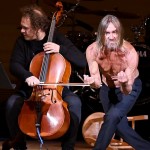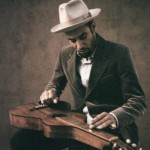Photos By Leland Gorlin
As the first hint of spring crept into the air, a diverse crowd gathered in the august Carnegie Hall for an equally venerable cause, the 26th Annual Tibet House US Benefit Concert. His Holiness the Dalai Lama helped inaugurate the Tibet House US in 1987, in the hopes of creating “a long-term cultural institution to ensure the survival of Tibetan civilization and culture, whatever the political destiny of the six million people of Tibet itself.” This hope still burns bright, but as President Robert Thurman reminded us in his introduction, we all must continue to do what we can to keep the Tibetan culture alive, a culture founded on peace, introspection, love and compassion– one we would all be served to take a lesson from.
The night opened with a stirring traditional chant by Tibetan monks, which served as a reminder that though we were there to be entertained, there was a far larger cause- and culture- at stake. Basia Bulat was the first performer of the night, decked out in a sparkly pink cape, gold metallic shoes and a sequined dress that reflected the light as she sang. “It Can’t Be You” proved a powerful opening song, her high, fast picking on the ukulele a striking contrast to her raspy alto.
Virtuosic harpist Lavinia Meijer joined Bulat for her second song, “Someday Soon,” and stayed onstage for “Traveler,” a piece featuring Tibet House artistic director Philip Glass on piano and Foday Musa Suso on the kora. Suso is a Gambian composer, musician and griot, which means he is an oral historian of the Mandingo people. His electric kora rang through the hall, a celebration of the truly international line-up of musicians.
Sharon Jones, with the help of the Patti Smith Band, injected some much needed energy into the evening, dancing from the moment she hit the stage in a sparkling metallic, dress and urging the audience to do the same as she burned and wailed her way through “She Ain’t A Child No More,” “Tell Me” and her big single that drew a huge response from the crowd, “100 Days, 100 Nights.”
Dechen Shak-Dagsay then took the stage with Helge Van Dyk to debut an avant, powerful combination of the former’s siren-like mantras and the latter’s spaced out music that bordered on prog rock. Unlike most of the other performers, Shak-Dagsay took the opportunity to address the theme of the evening, introducing her final piece as a healing Tibetan mantra meant to “transform our negative, distracted emotions.” I couldn’t help a sideways glance at the man sitting next to me, lost in half a dozen text conversations.
Next, FKA Twigs glided on stage looking beautiful and bizarre, clad- along with her drummer and two guitar players- in flowing white pants and matching white robes. FKA’s ensemble was diamond encrusted, and halfway through the second song- her just dropped single, “Good To Love”- she removed her top to reveal a nude, similarly bedazzled skin-tight top underneath. Her ethereal voice combined powerfully with her slinky, acrobatic dance moves and gymnastic leaps and tumbles across the stage. When she left the stage, I found myself longing for just one more song.
Gogol Bordello was a riot, in part because, stools? Gogol Bordello don’t need no stinkin’ stools. Approximately 15 seconds into their first song, “My Companjera,” Eugene Hütz, the lead vocalist for the internationally acclaimed gypsy punk outfit, was out of his seat and jumping around—the rest of the band soon followed, accordions, guitars and other cumbersome instruments notwithstanding. They took things down a notch with the ballad, “When the Universes Collide,” and rounded out their set with “Pala Tutue.”
The brevity of the sets and abruptness of their conclusion felt a bit like cutting someone fascinating off mid-sentence. But, that’s the nature of the beast, and whoever set the order of the evening – perhaps it was Glass himself – did a good job of balancing subdued, classical talent with barnstorming rock outfits.
By the time a suit-clad Iggy Pop took the stage, it was clear he was the biggest draw. He hadn’t even made it to the mic before shouts of “We love you Iggy” could be heard from a (finally) riled up audience. Those expecting the writhing, shirtless punk God may have been a bit disappointed, or at least perplexed, however, when he opened his four song set with two spoken word pieces set to the music of the Scorchio Quartet, a longtime fixture of the annual benefit show.
His first piece, “I Talked To A Smart Guy,” was a stream of consciousness piece about the pervasive greed in our society, but it was the following piece, “Mom and Dad are Gone,” set to Glass’ “String Quartet #5” that was truly heart wrenching. Pop, the king of fuck-you punk, stalked back and forth on the darkly lit stage and cried out into the hall, “Mom and dad, I love you… I’m sorry, I should have loved you more. Mom and dad are gone, and I am now alone.”
By the third piece, Pop shook out of his experimental reverie and gave fans the kind of gem they were dreaming of– a rocking rendition of “Jean Genie,” with a fittingly quirky homage to his recently deceased collaborator and friend: “Of course I did that in memory of David Bowie, But it’s also true that it’s just a cool song and you just want to do it whenever you can.”
Afterwards, he kicked straight into “Tonight,” another nod to Bowie (they co-wrote the song for Pop’s 1977 album, Lust For Life), and encouraged everyone to join in on the “deceptively simple lyric:” “everything will be all right, tonight.” Thanks to one intrepid, young superfan, who dodged two guards to dance front and center, all decorum in the hallowed hall was broken, and the staid audience rushed the stage, for a sing along with Pop, Jones, Glass, and the rest of the evening’s performers.
And just like that the show was over, and we were ushered back into the night air, sent forth to carry on the evening’s ever salient message of friend over enemy and love over hate.
– Emily Gawlak



























Be the first to comment!